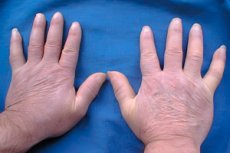New publications
Antioxidant supplement may help fight systemic sclerosis
Last reviewed: 02.07.2025

All iLive content is medically reviewed or fact checked to ensure as much factual accuracy as possible.
We have strict sourcing guidelines and only link to reputable media sites, academic research institutions and, whenever possible, medically peer reviewed studies. Note that the numbers in parentheses ([1], [2], etc.) are clickable links to these studies.
If you feel that any of our content is inaccurate, out-of-date, or otherwise questionable, please select it and press Ctrl + Enter.

Autoimmune diseases occur when the body's immune system attacks healthy cells instead of protecting them. Systemic sclerosis (SSC) is one such autoimmune disease, characterized by impaired blood flow and immune function, leading to fibrosis (hardening and scarring of healthy tissue) of the skin and internal organs.
It is known that SCS affects patients throughout their life, thereby impairing their quality of life. Although the exact mechanisms of SCS development and progression are not fully understood, a complex interrelated mechanism of immune, hormonal, environmental and genetic factors is usually involved.
Additionally, about 90% of patients with SCS experience a phenomenon known as "Raynaud's phenomenon (RP)." This involves spasms of small blood vessels, which results in decreased blood flow. RP, in turn, can contribute to an increase in the generation of molecules called reactive oxygen species (ROS). The resulting oxidative environment causes cellular damage and fibrosis, which further worsens the disease.
In this regard, the use of antioxidants to combat oxidative stress is actively being explored as a therapeutic strategy. However, antioxidants alone may not be effective enough to reduce oxidative stress.
To this end, a team of researchers from Japan led by Professor Haruhiko Inufusa, Chief Scientist at the Louis Pasteur Medical Research Center and Distinguished Researcher at the Antioxidant Research Center at Gifu University, investigated the effectiveness of Twendee X (TwX), a dietary supplement consisting of a combination of eight active antioxidants, in reducing oxidative stress in mouse models of SSc.
Explaining the rationale behind their work, published March 6, 2024, in the International Journal of Molecular Sciences, Professor Inufusa says: “Studies have shown that TwX reduces ROS levels, protects mitochondrial function, and improves cognitive function and memory. Daily management of oxidative stress with this supplement may not only help maintain health and prevent disease, but also improve symptoms of difficult-to-treat diseases such as MS.”
The eight components of TwX include vitamin C, L-glutamine, niacin, L-cystine, coenzyme Q10, vitamin B2, succinic acid, and fumaric acid. The combined antioxidant effect is likely more powerful than the activity of each compound alone. Previous studies have shown improved cognitive ability, memory, and motor coordination in mice with dementia, as well as reduced lesion size, oxidative stress, and inflammation in mouse models of ischemic stroke after TwX treatment.
Based on these results, the researchers conducted a study of the effects of TwX on a hypochlorite (HOCl)-based mouse model of CKD.
HOCl induction resulted in a significant increase in serum levels of advanced oxidation protein products (AOPP), mimicking the features of SCZ. Further HOCl induction caused thickening of skin tissues together with local and systemic inflammation, fibrosis and vascular damage.
Notably, AOPP levels in TwX-treated mice were significantly lower than those in healthy animals. In addition, TwX treatment significantly reduced skin thickness, collagen accumulation, skin hydroxyproline levels, a marker of oxidative stress, and skin and lung fibrosis.
Additionally, TwX treatment significantly reduced levels of α-smooth muscle actin (α-SMA), a protein that is elevated in response to HOCl induction and has been shown to activate ROS in fibrotic diseases. HOCl-induced animals treated with TwX also showed a trend toward decreased levels of inflammatory cytokines and activated immune cells involved in inflammatory responses.
Overall, these results suggest that TwX may treat SCLS by regulating oxidative stress and reducing skin and lung fibrosis. Since these results were observed in a mouse model, further studies are needed to confirm the efficacy of TwX in SCLS patients. However, given the benefits of TwX in other oxidative stress-related diseases and the lack of side effects, TwX has significant potential as an antioxidant therapy against SCLS.
Professor Inufusa said: "Although TwX is a dietary supplement, it has undergone drug-level safety testing and can be used by a wide range of people, from children to adults. Additionally, our results suggest that TwX may have the potential to alleviate symptoms of difficult-to-treat oxidative stress-related diseases such as MS."
